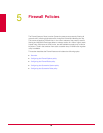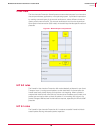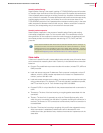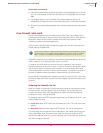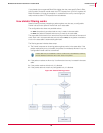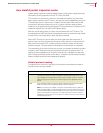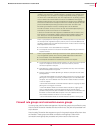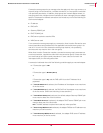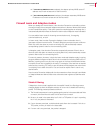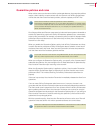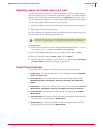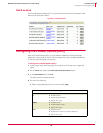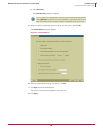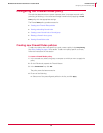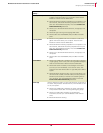
75
McAfee
®
Host Intrusion Prevention 6.1 Product Guide Firewall Policies
Overview
5
Connection-aware groups let you manage rules that apply only when you connect to a
network using a wired connection, a wireless connection, or a non-specific connection
with particular parameters. In addition, these groups are network adapter-aware, so
that computers with multiple network interfaces can have rules apply that are adapter
specific. Parameters for allowed connections can include any or all of the following for
each network adapter:
IP address
DNS suffix
Gateway IP/MAC pair
DHCP IP/MAC pair
DNS server queried to resolve URLs
WINS server used
If two connection-aware groups apply to a connection, Host Intrusion Prevention uses
normal precedence and processes the first applicable connection-aware group in its
rule list. If no rule in the first connection-aware group matches, rule processing
continues and may match a rule in the next group.
When Host Intrusion Prevention matches a connection-aware group’s parameters to
an active connection, it applies the rules within the connection group. It treats the rules
as a small rule set and uses normal precedence. If some rules do not match the
intercepted traffic, the firewall ignores them.
A connection is allowed when all of the following conditions apply to a network adapter:
If Connection type is LAN.
or
If Connection type is
Wireless (802.11).
or
If Connection type is Any and the DNS suffix list or the IP Address List is
populated.
If Check IP Address List is selected, the IP address of the adapter must match one
of the list entries.
If Check DNS Suffix List is selected, the DNS suffix of the adapter must match one
of the list entries. (DNS name matching is case sensitive.)
If Check Default Gateway List is selected, the default adapter Gateway IP/MAC pair
must match at least one of the list entries.
If Check DHCP Server List is selected, the adapter DHCP server IP/MAC pair must
match at least one of the list entries.
Note: The MAC address is optional and used only when specified.
If Check Primary DNS Server List is selected, the adapter DNS server IP address must
match any of the list entries.
If Check Secondary DNS Server List is selected, the adapter DNS server IP address
must match any of the list entries.




